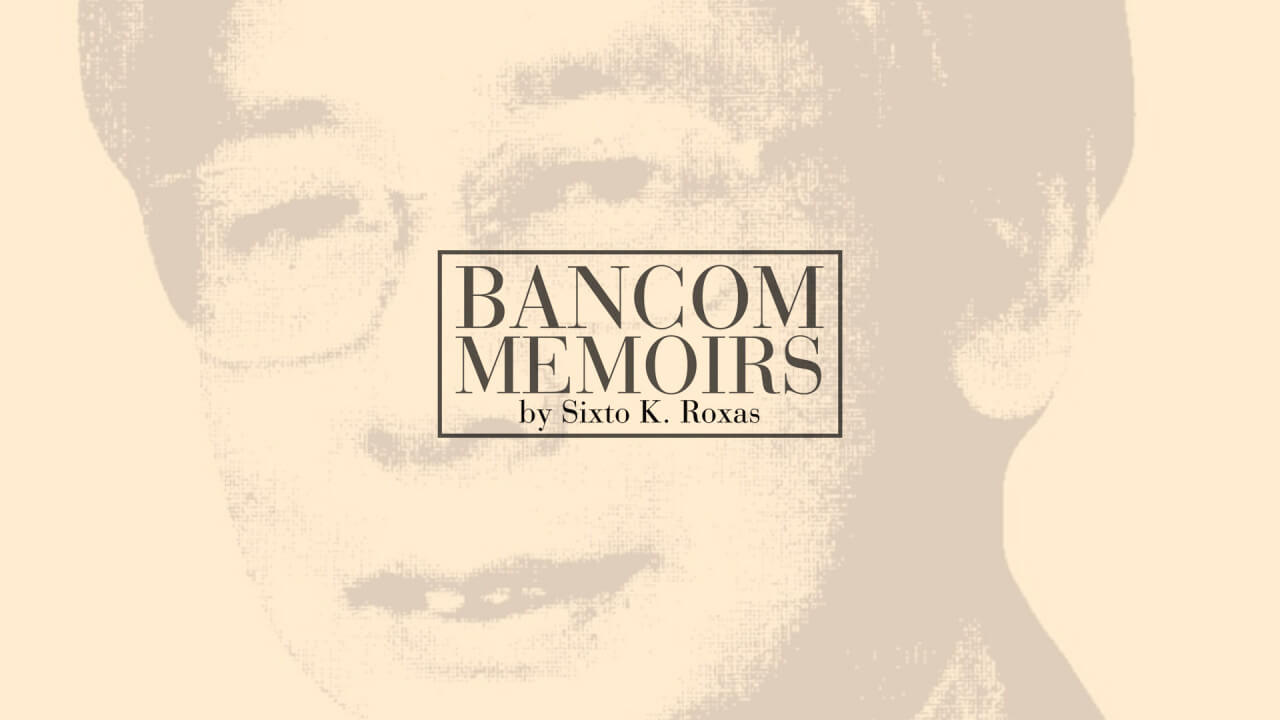

Popularly known as SKR, he was at one point or the other a labor leader, journalist, economics lecturer at universities here and abroad, economist at the Central Bank of the Philippines and Philippine National Bank, cabinet member heading economic planning, petroleum company chief finance officer, the first Filipino president of the Asian Institute of Management, recipient of the Ten Outstanding Young Men (TOYM) for economics, and, of course, CEO of the Bancom Group — the first firm in the country to be engaged in the business what would later be called “investment banking”.
He was also early into yoga and took up riding seriously as a hobby.
“It’s a bit overwhelming to have so many people share this moment with us,” said Roxas in his remarks. “I was very privileged to be asked to be the author of this because it’s not my story alone it is the story of all of you. It’s all our story.”
The event was, by all accounts, equally successful and joyous with some 400 of the firm’s alumni and guests in attendance. Everyone came not just to reconnect and reminisce the glory days of the trailblazing investment bank, but to celebrate and honor Roxas, then 86, the man whose vision, brilliance, and brains made Bancom what it came to be during its peak, the story of which he had set to paper in an exhaustive yet compelling tome.
Among the esteemed guests was business tycoon Manuel V. Pangilinan, who was involved in Bancom International Limited in Hong Kong and was the primary sponsor of the book.
Upon learning of SKR’s passing on July 24, 2024 at 96, Pangilinan — the firm's most successful alumnus — shared with InsiderPH his message: “When SKR spoke, everybody listened. His was a voice informed by his many passions and adventures — whether in business, education, or advocacies.”
“During my time in Bancom, we admired his great intellect, his vision, and even his sartorial elegance,” he added. “He deserved the many distinguished positions he took on during his lifetime, including being the first Filipino president of the Asian Institute of Management, and vice chairman and global head of investment banking of American Express Bank in New York.”
Allow us, then, to pay our own small tribute to SKR, as we look back on his remarkable life and the captivating times he lived through.
Early life and family
Sixto K. Roxas was born on August 6, 1927, within the campus of U.P. College of Agriculture in Los Baños, Laguna. His father, Manuel Luz Roxas, an agricultural chemist, taught chemistry there. In his own words he described his family background as “a richly endowed catholic and intellectual life condition, [with] a deeply religious mother and an intellectual father.”
Roxas recalls accompanying his father, who served as director of the Bureau of Plant Industry and later second undersecretary of the Department of Agriculture, on hunting trips and on government-related field trips visiting fishponds and fish canneries, textile mills, and sugar mills, all of which no doubt made a strong impression on him. It was during hunting trips as a student that he first got exposed to the lives of our rural population. “I saw their poverty and how their lives compared with ours in the towns.”
Meanwhile, his mother wanted him to become a doctor hence his focus on A.B. pre-medicine at the Ateneo de Manila — philosophy, theology, mathematics, biology and natural science — graduating summa cum laude.
SKR the labor leader
It was his involvement, however, in the organization of the Federation of Free Workers after graduation in March of 1950 that was a major life turning point. “Our crusade was really to start a legitimate labor movement,” said Roxas.
As a labor leader forming labor unions and holding strikes, such as those against Philippine Trust Bank and Philippine Airlines, he realized that “the social pathology, the social ills, were more serious than individual ills” and that “poverty was not simply a problem of social justice or a maldistribution of incomes but a problem of production and inadequate total incomes.”
This awakening led to his forgoing medicine in favor of entering Fordham University for a master’s degree in economics, his dissertation focusing on the processes by which poor nations become wealthy.
Economics at the Central Bank and PNB
Returning to the Philippines it was at the Central Bank and later the Philippine National Bank (PNB) that Roxas honed and put into practice his newly gained economics knowhow, pursuing his public advocacy “to launch the country on to a sound, inclusionary, and sustainable development course.”
He was also by this time a professor in various schools and a regular columnist at the Manila Chronicle.
Industrial management and a return to government
Deciding it was time to move to hands-on industrial management, Roxas joined FilOil, the first Filipino petroleum company under the PHINMA Group of Filemon Rodriguez and Ramon del Rosario.
It was as vice president and later executive vice president that Roxas drew on his PNB experience in the realm of financing industrial projects and exploring their feasibility.
“We had to do a financial model of petroleum operations, refining, and a consolidated balance sheet projection, income statement projection, cash flow projection, etc. You must remember that there were no computers then. So we were doing all that modeling work on mechanical calculators,” said Roxas in a 2007 interview.
A short return to government followed as President Diosdado Macapagal’s Assistant Executive Secretary for Economic Affairs, where he spearheaded the Program Implementation Agency (PIA) that was tasked with “carrying out in an efficient and coordinated mode the processes required to accomplish the targets and goals of the Five-Year Development Program of the Macapagal administration.”
It was here that Roxas was instrumental in the development of the “operations room” led by Navy man Alex Melchor, the main resource center for government programs that provided a progress report on all its projects.
Roxas would subsequently serve as chairman of the National Economic Council (NEC), forerunner of the National Economic Development Authority (NEDA), which he lamented “was an impotent organization” and governor of the Land Authority, where he was credited with helping write the code that would become the Agriculture Land Reform Code or RA3844 in 1963.
CEO of Bancom
Yet, it was his role as president and CEO of Bancom that Roxas would be best remembered and where he arguably made the biggest impact.
Founded in January 1965 as a partnership between Commercial Bank and Trust Company, then among the top 10 local banks, and Bankers Trust Company of New York with “P7 million of capital, four executives and a support staff of three,” it was at Bancom that Roxas sought to apply his sustainable development ideas.
Investment banking and beyond
Starting as an investment bank, “an intermediary between sources of loan and investment capital and their users,” and as “an underwriter and dealer in all classes of financial instruments issued by government and private sector businesses,” Bancom pioneered the development of the money market, “a new mode of intermediation between sources and users of money — between savers and investors.”
Bancom also pioneered the creation of the Treasury Bill market which was rolled out in May 1966 “after a very tight money situation because of the 1965 crisis.”
Driven by Roxas’ vision of building “a total development company”, by 1975, a decade hence, Bancom had drastically changed its shape and complexion, offering a full range of products, professional, technical and financial service lines “that would suit the needs of local communities at every stage of development, under-development or over-development, in every corner of the country.”
Bancom was involved in at least 20 equity underwritings, raising approximately P300 million in equity for new as well as established companies going public. At least P10 billion in bond issues and medium-term debt were arranged.
Bancom would also attract the best and the brightest, the young and the restless, among them Luis Villafuerte, Ramon Ilusorio, Ricardo Pascua, Ramon del Rosario Jr., Eduardo Yotoko, and Evelyn Singson, to name a few. In a television interview, Roxas described the cadre that Bancom was able to attract and develop:
“Most of the graduates that came to us finished [schooling] at that period and most came fresh out of school with their own visions. What attracted them to Bancom was the idea that here was a company trying new things, in a way Bancom was like a post-graduate university for them.”
Joining American Express
In 1976, Roxas accepted an invitation to become vice chairman of the American Express Bank in New York and Chairman of Amex Bank, a merchant bank in London, which meant relocating to the US with his family.
By this period Bancom had 24 subsidiaries and affiliates, with a newly formed domestic flagship holding company, Bancom Philippine Holdings, later to follow. An international firm, Bancom International Holdings Ltd., would also be formed as the parent company of the whole group.
Life after Bancom
Due to a number of external and internal factors not the least of which was the 1981 Dewey Dee crisis that rocked the local banking system (with businessman Dewey Dee fleeing the country with nearly $85 million in unpaid debts), Bancom would unravel and unfold after 17 years of existence.
Roxas said “its demise came quietly in the midst of tremendous financial convulsions the country witnessed in 1981”, with the firm eventually merging with Unionbank as the surviving entity.
“We never missed on a liquidation of a placement. We honored all the placements with us,” he said of their commitment to their clients. “It was only the stockholders who lost money.”
After resigning from Bancom, Roxas wasted no time in establishing both a consulting company, SKR Managers and Advisors, Inc., through which he pioneered the development of the market municipal bonds, and a non-profit foundation, The Foundation for Community Organization and Management Technology.
He also involved himself in a number of non-profit foundations and NGOs such as the Maximo T. Kalaw Institute for Sustainable Development, Philippine Business for Social Progress, Green Forum, Foundation for the Philippine Environment and the Philippine Rural Reconstruction Movement. During the term of Gloria Macapagal Arroyo, he was briefly Undersecretary for International and Economic Relations of the Department of Foreign Affairs. He also authored Juetengate: The Parable of a Nation in Crisis, published in 2000.
Leader of the Band
In all of these undertakings, Roxas — whose favorite song, aptly enough, was Dan Fogelberg’s Leader of the Band — never lost sight of his obsession with development and his profession as a sustainable development practitioner.
“He may have passed, but the best way to honor him is to keep his legacy alive, by the many fledgling bankers and entrepreneurs who learned from him in Bancom, myself included — and have since moved on to sail into the world and navigate the unpredictable tides of Philippine business with success, integrity, and style — like SKR did,” said Pangilinan.

Features Reporter